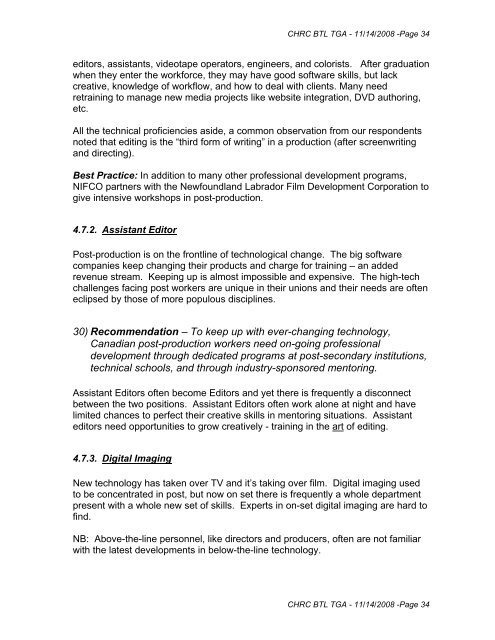Below-the-Line Film and Television Workers - Conseil des ...
Below-the-Line Film and Television Workers - Conseil des ...
Below-the-Line Film and Television Workers - Conseil des ...
- No tags were found...
Create successful ePaper yourself
Turn your PDF publications into a flip-book with our unique Google optimized e-Paper software.
CHRC BTL TGA - 11/14/2008 -Page 34editors, assistants, videotape operators, engineers, <strong>and</strong> colorists. After graduationwhen <strong>the</strong>y enter <strong>the</strong> workforce, <strong>the</strong>y may have good software skills, but lackcreative, knowledge of workflow, <strong>and</strong> how to deal with clients. Many needretraining to manage new media projects like website integration, DVD authoring,etc.All <strong>the</strong> technical proficiencies aside, a common observation from our respondentsnoted that editing is <strong>the</strong> “third form of writing” in a production (after screenwriting<strong>and</strong> directing).Best Practice: In addition to many o<strong>the</strong>r professional development programs,NIFCO partners with <strong>the</strong> Newfoundl<strong>and</strong> Labrador <strong>Film</strong> Development Corporation togive intensive workshops in post-production.4.7.2. Assistant EditorPost-production is on <strong>the</strong> frontline of technological change. The big softwarecompanies keep changing <strong>the</strong>ir products <strong>and</strong> charge for training – an addedrevenue stream. Keeping up is almost impossible <strong>and</strong> expensive. The high-techchallenges facing post workers are unique in <strong>the</strong>ir unions <strong>and</strong> <strong>the</strong>ir needs are ofteneclipsed by those of more populous disciplines.30) Recommendation – To keep up with ever-changing technology,Canadian post-production workers need on-going professionaldevelopment through dedicated programs at post-secondary institutions,technical schools, <strong>and</strong> through industry-sponsored mentoring.Assistant Editors often become Editors <strong>and</strong> yet <strong>the</strong>re is frequently a disconnectbetween <strong>the</strong> two positions. Assistant Editors often work alone at night <strong>and</strong> havelimited chances to perfect <strong>the</strong>ir creative skills in mentoring situations. Assistanteditors need opportunities to grow creatively - training in <strong>the</strong> art of editing.4.7.3. Digital ImagingNew technology has taken over TV <strong>and</strong> it’s taking over film. Digital imaging usedto be concentrated in post, but now on set <strong>the</strong>re is frequently a whole departmentpresent with a whole new set of skills. Experts in on-set digital imaging are hard tofind.NB: Above-<strong>the</strong>-line personnel, like directors <strong>and</strong> producers, often are not familiarwith <strong>the</strong> latest developments in below-<strong>the</strong>-line technology.CHRC BTL TGA - 11/14/2008 -Page 34










